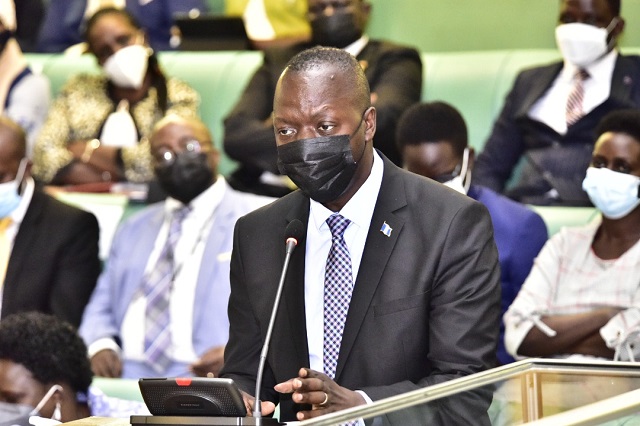
Kampala, Uganda | THE INDEPENDENT | Parliament has asked government to develop mechanisms that will ensure the country returns to a low risk of debt distress.
During plenary on Tuesday, 30 August 2022, Parliament approved two reports of the Committee on National Economy on the State of Indebtedness, Grants and Guarantees and another one on the performance of the economy.
According to Robert Migadde, the vice chairperson of the committee, the total public debt has increased over recent years due to the implementation of the Government’s investment agenda and the effects of the COVID-l9 pandemic that caused revenue shortfalls.
According to the report, Uganda’s public debt stock increased by 22 percent from Shs56.938 trillion in the Financial Year 2019/20 to Shs69.513 trillion by end of the Financial Year 2020/21.
Migadde says that public debt is projected to increase over the medium term as government continues to implement its investment programme to boost economic recovery, and whereas the debt level is still sustainable, debt service ratios point to elevated risks majorly due to the slower growth of export earnings.
He also proposed that government should support economic growth by boosting exports to enhance the country’s reserves among other things.
Migadde added that government should boost her efforts in production for export to mitigate against these risks, adding that Uganda’s debt carrying capacity was revised to “medium” at end of June 2020 from “strong” as of June 2019.
“It remained medium at end of June 2021. Similarly, Uganda’s public debt has elevated risks to its portfolio. It is now at moderate risk of external debt distress and overall public debt distress, up from a low risk of debt distress in June 2019. This implies that the country’s debt sustainability is assessed using stricter terms compared to that with low risk of debt distress.” Migadde said in his report.
The committee also recommended that government develops a deliberate implementable strategy to clear domestic arrears within the medium term as a means of supporting the economy and reducing the costs of doing business.
The committee also called on government departments, agencies and ministries to prioritise counterpart funds to ensure efficient, effective, and timely implementation of projects to maximise returns to borrowing and minimise deviations from fiscal plans.
“In addition, the committee reiterates its recommendations that government should limit highly non-concessional and commercial borrowing to only projects with a high economic return and fiscal return. Furthermore, government should fast-track the development of the oil and gas sector to ensure that oil exports commence in the Financial Year 2024/25 as planned,” he said.
The committee observed that government is incurring a significant loss in tax revenues due to numerous laws that allow exemptions or deductions from gross income or deferred tax liabilities.
“They include payments of taxes by government on behalf of investors; payment of taxes on goods procured by organisations where government is obliged by agreement and; on behalf of some religious, cultural and Non-Government Organisations (NGOs),” the report reads.
According to the report, in the Financial Year 2020/21 alone, URA collected Shs18.3 trillion (12.4 % of GDP) and lost Shs7.7 trillion (5.2 % of GDP), implying that without the tax expenditures, the government could have collected Shs26 trillion. (17.6 %). He says with 17.6 percent of tax revenues to GDP, the country’s budget deficit would significantly decline and reduce the borrowing need.
The committee also recommended that government reduces domestic borrowing, to slow down the ratio of domestic debt to private sector credit, adding that this will ensure that domestic borrowing does not crowd out the private sector growth.
Several MPs raised different concerns about the report with many proposing that government focuses on agriculture and exports.
David Sserukenya, the MP for Makindye-Ssabagabo Municipality, said there is a need for value addition in agriculture, but also more emphasis should be put on Buy Uganda, Build Uganda.
“We need to major in agriculture by mechanisation and value addition that is when we can make more money in the country. We need to emphasise on Buy Uganda Build Uganda,” Sserukenya said.
Tororo district woman representative, Sarah Opendi said that Uganda is not short of resources but there is a high level of corruption, coupled with the illicit financial flow which is affecting development.
“I was shocked that our stock of debt is now at Shs78 trillion – that is not pleasant to us. We have in the recent years been borrowing to finance our recurrent expenditure, something that should not happen. I want to attribute all this to the illicit financial flow, like corruption and opaqueness in the mineral sector,” she said.
The Deputy Speaker of Parliament, Thomas Tayebwa, emphasised value addition, stating that this is where Uganda can recoup what it is losing.
“I was in Milan and I went to the coffee roaster of Starbucks – Arabica coffee from Uganda was being sold at 45 euros a kilogramme – but the same Arabica coffee from my constituency is bought at Shs6500 a kilogramme, not even two euros – and then someone who is not even in coffee planting is earning that much! We need to ensure that we add value,” he said.
Dokolo North County MP, Moses Ogwal, said that government needs to boost the purchasing power of the local people which will solve the issue of revenue and industrialisation.
*****
SOURCE: UGANDA PARLIAMENT MEDIA
 The Independent Uganda: You get the Truth we Pay the Price
The Independent Uganda: You get the Truth we Pay the Price



